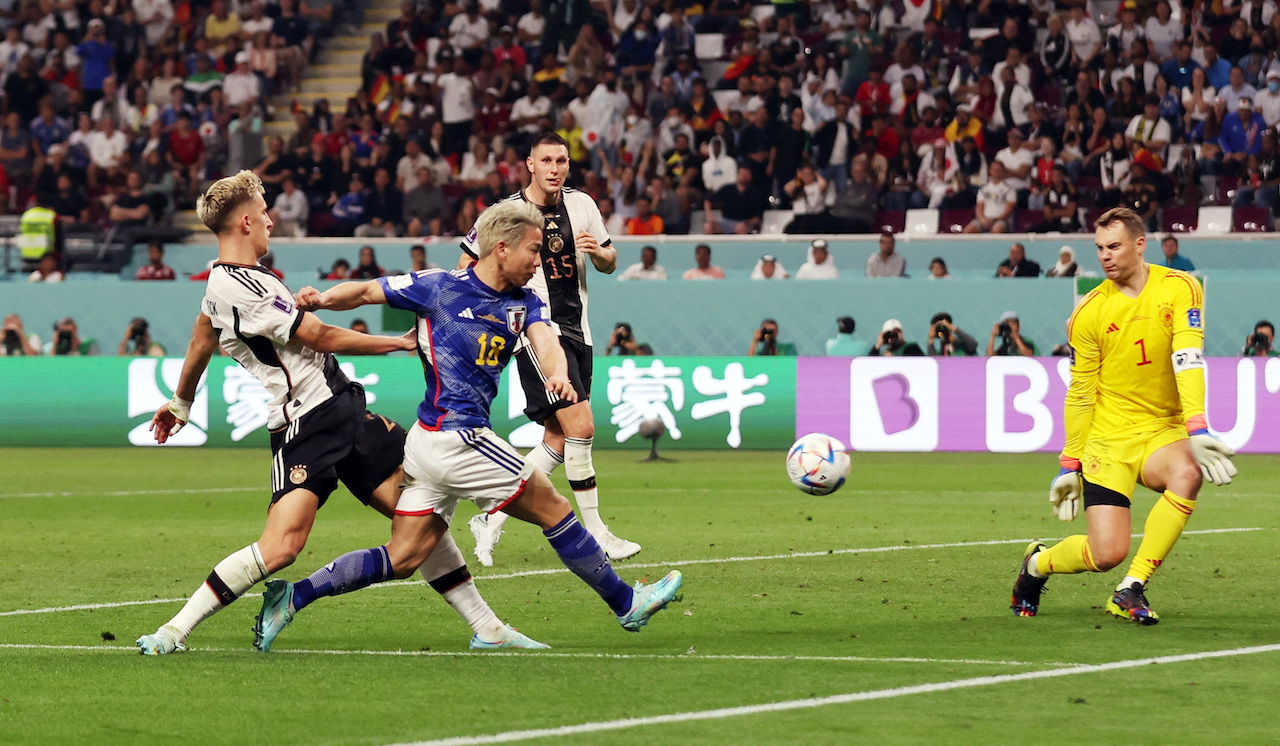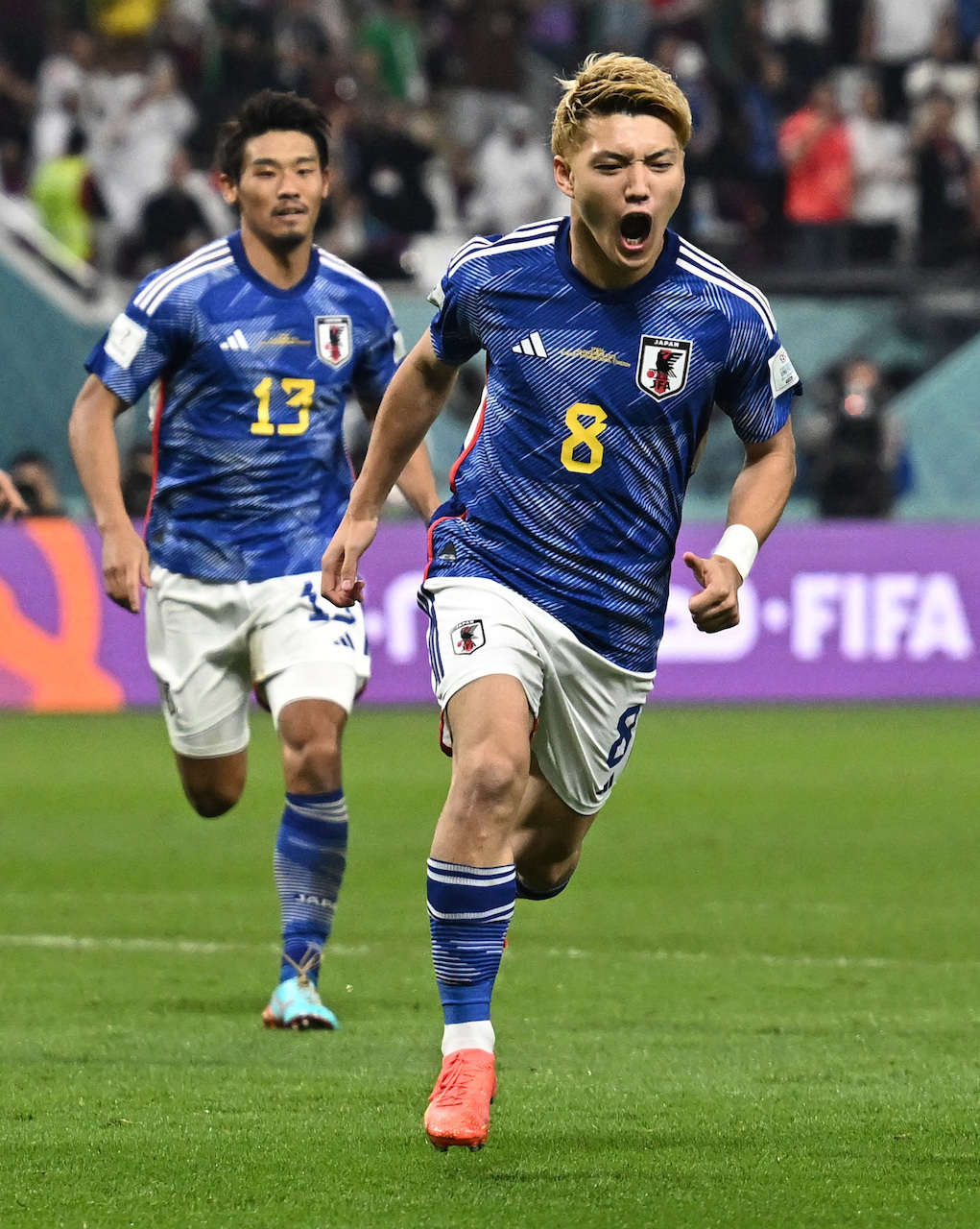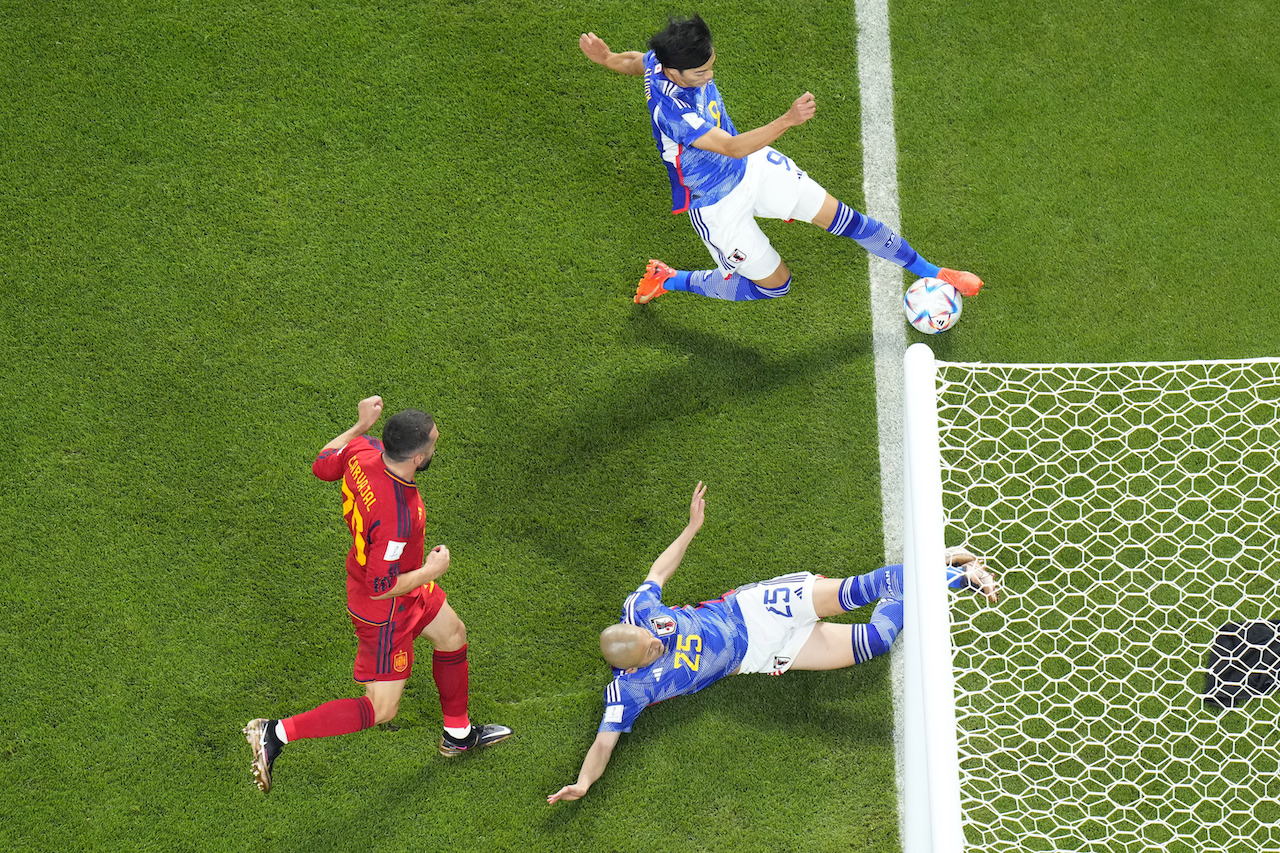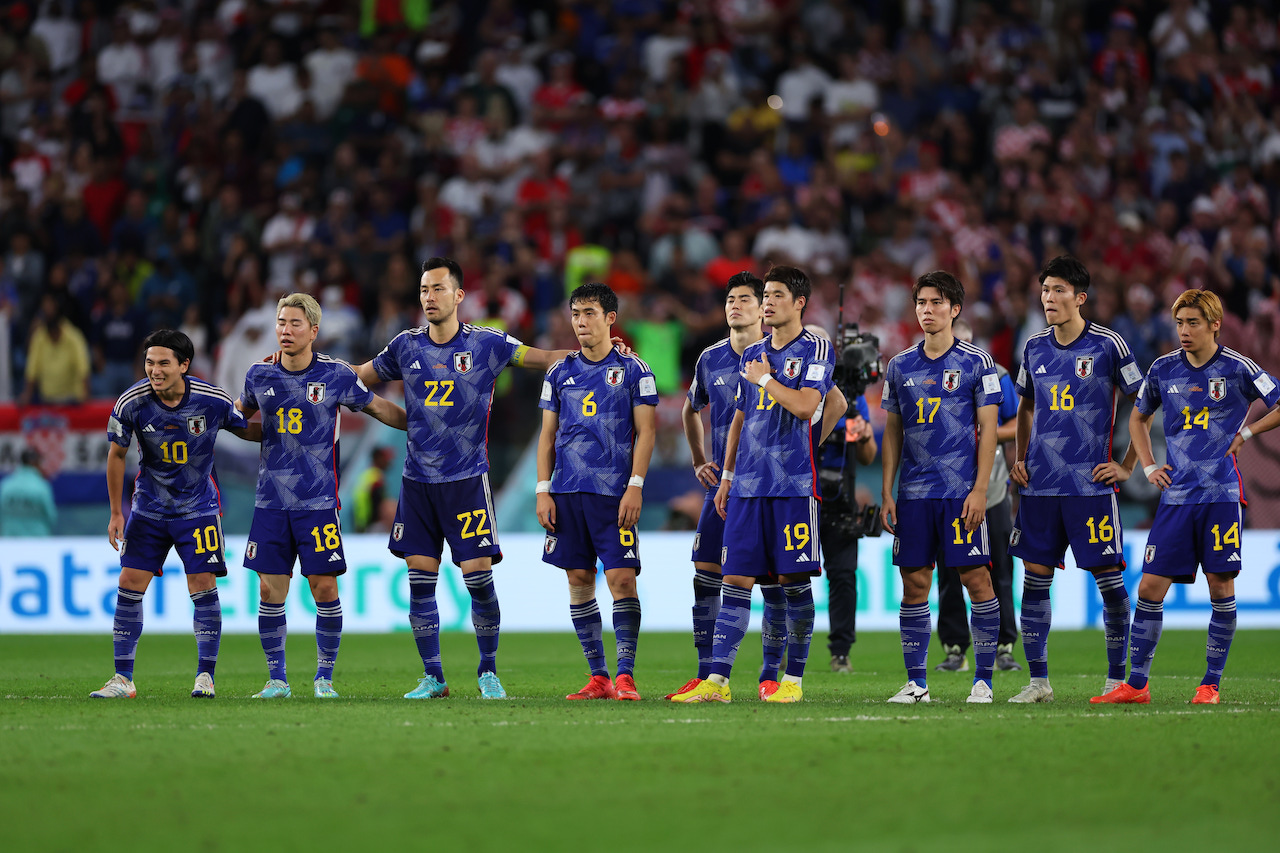And so, after arguably the greatest of all finals it was the greatest of all players who lifted football’s ultimate prize. Few would begrudge Argentina their third World Cup title or their talisman Lionel Messi the one major trophy to have eluded him in his spellbinding career.

Lionel Messi holds aloft the World Cup Photo: picture alliance/AFLO
As millions around the world watched the Albiceleste celebrate, only the churlish would have recalled the team’s “shock” defeat to Saudi Arabia in the group stage or their struggles against Australia in the first knockout round. The best team had won it and “well played” to them!
And yet, FIFA World Cup Qatar 2022 was notable for its unpredictability, with “upsets” and schadenfreude moments aplenty for all to enjoy, not least for those watching in Japan. Now that the dust has settled, it’s time to reflect.
“No Easy Games”
Argentina had entered the tournament on a remarkable three-year, 36-game unbeaten run and as holders of the Copa America. Along with France and Brazil, they were among the favorites to win it. However, Argentina’s long undefeated run would come to a “humiliating” end in their opening match, their cloak of invincibility snatched away by Saudi Arabia, who thrillingly came from a goal behind to win the match 2-1.
“Saudi [Arabia] were tremendous in every aspect; Argentina were wan, and when they needed to step it up, they looked in the larder and found nothing.”1
According to the online bookmaker BetMGM, the result was the “biggest upset in World Cup history. Saudi Arabia were +1800 to win the game before it started!”2
But was Argentina 1 v Saudi Arabia 2 really such an “upset”? Saudi Arabia had finished top of Group B in the final round of the AFC Asian Qualifiers, a point above Japan and 8 points clear of third-place Australia. To followers of international football in Asia, Saudi Arabia’s victory over Argentina was perhaps not so much a “shock” as a “pleasant surprise.”
“This is football,” said Saudi Arabia coach Herve Renard with textbook modesty. “Sometimes crazy things happen.”3 But tellingly, FIFA World Cup 2022 Qatar would produce more such “crazy” results:
• Australia beat Denmark, semi-finalists at last year’s Euros, (and Tunisia) and advanced to the Round of 16
• Tunisia beat France (albeit in a dead rubber)
• South Korea beat Portugal and advanced to the Round of 16 — at the expense of Uruguay and Ghana
• Morocco, playing some of the tournament’s most beautiful football, beat European powerhouses Belgium, Portugal and Spain before running out of steam against France in the semi-finals
• And what about Japan!
Fine Margins
Two of the tournament’s biggest “upsets” were those dished out by the Blue Samurai in Group E to former World Cup winners Germany (2-1) and Spain (2-1).
“That is nothing more than Japan deserve!” wrote the Guardian’s Scott Murray at the end of his live coverage of the Japan-Germany match. “They were the equals of Germany in the first half, and – sensationally – their betters in the second! It’s all down to Hajime Moriyasu’s slew of substitutes, all of whom made an impact. A managerial masterclass … and his players aren’t half bad either!”

Japan’s Asano Takuma fires past Germany’s Manuel Neuer to make it 2-1 for Japan Photo: Reuters/AFLO
Though Japan came unstuck against Costa Rica in Game 2, the Samurai Blue repeated the comeback trick against Spain in their final match of the group stage, once again shocking their opponent with a quick-fire double in the second half to win.

Doan Ritsu wheels away after scoring Japan’s first goal against Spain Photo: AP/AFLO
It is often said that football — in particular international tournament football — is a game of “fine margins.” This notion was captured in microcosm in Japan’s match against Spain, when Mitoma Kaoru pulled the ball back from the goal line for Tanaka Ao to bundle in Japan’s winner. Did the ball cross the line before Mitoma hooked his orange boot around it? The microchip in the ball and VAR said it did not, and the goal stood. Such are the fine margins that decide matches at the top of the international game. “Millimetric off-sides” can make all the difference, as Lionel Scaloni grumbled after Argentina’s defeat to Saudi Arabia.

Did it cross the line? No. Mitoma Kaoru pulls the ball back from the goal line for Tanaka Ao [not in picture] to score what would prove to be Japan’s winner against Spain. Photo Reuters/AFLO
Despite the loss to Costa Rica, victory against Spain was enough to see Japan progress to the first knockout round as group winners. The pre-tournament target set by coach Moriyasu was to progress from here, for the first time, to the quarter-finals.
Japan’s opponents were Croatia, World Cup runners-up in 2018. Japan started the match well and took the lead through Maeda Daizen before Croatia slowly began to grind Japan down and that man Ivan Perisic leveled things with a freakishly good long-distance header. The game went to extra time and then penalties where Japan’s luck, just as it had in 2018, finally ran out.

And Livakovic saves again. Japan team players watch on forlorn as the penalty competition unravels and … Croatia progress Photo: Morita Naoki/Aflo Sports
The quarter finals will again be the target as Japan looks forward to World Cup 2026. It should be no surprise now to anybody if they make it, provided they qualify, of course.
Road to 2026
Japan enters the AFC Asian Qualifiers for the 2026 FIFA World Cup at Round 2, with the first fixture to be played on November 16, 2023.
The road to the USA, Canada and Mexico — and before that to Qatar again for the 2023 Asian Cup (to be played in 2024) and the Paris Olympics (also in 2024) will again be marshalled by Moriyasu, whom the Japan Football Association confirmed on December 28, 2022 had agreed to a contract extension and will continue in his role.
Parts of the Japan squad are aging and will need refreshing, certainly before 2026. Veteran defender Nagatomo Yuto (age 36, 142 caps) hinted as much when he spoke after the Croatia match.
“Our younger players will take this disappointment and use it to drive Japanese soccer going forward. This experience will absolutely tie into what happens next.”4
But Nagatomo has not retired yet and neither has the captain, Yoshida Maya (34, 126 caps). So it seems likely that changes to the squad will continue to be made incrementally over time, as they have since Moriyasu took charge of both the Samurai Blue and Olympic teams four years ago, with the best players from the latter (and other Japan youth teams) being studiously released into the former.
Of the 26 players in the Japan squad for Qatar, 19 play in European leagues. The import of Japanese talent by top European clubs typifies the globalization of football, the free movement of players and managers across leagues. On the evidence of the 2022 World Cup, this process is “closing the gap” at the national level between the traditional European and South American powerhouses and the teams of the Asian and African confederations.
The World Cup has still never been won by a team from outside the continents of Europe or South America, nor has one even contested the final, but the performances at Qatar 2022 of Morocco — the first African team to reach the semi-finals of the competition — Japan and, yes, Saudi Arabia, suggest this could be about to change.
“We can take confidence from being able to beat past World Cup champions,” Moriyasu said after the defeat to Croatia. “If we stop thinking about catching up and start thinking about overtaking them, our future is bright.”
Alex Hendy, The Japan Journal
Sources/footnotes:
1. Daniel Harris, The Guardian, “Minute by Minute” match summary.
2. BetMGM tweet via sportingnews.com. (Odds of +1800 is the equivalent of 18 to 1, meaning a payout of $1,800 for a $100 bet.)
3. Dhiman Sarkar, Hindustan Times, match report
4. Dan Orlowitz, The Japan Times, “As Japan exits the World Cup, eyes turn to the team’s future,” December 6
